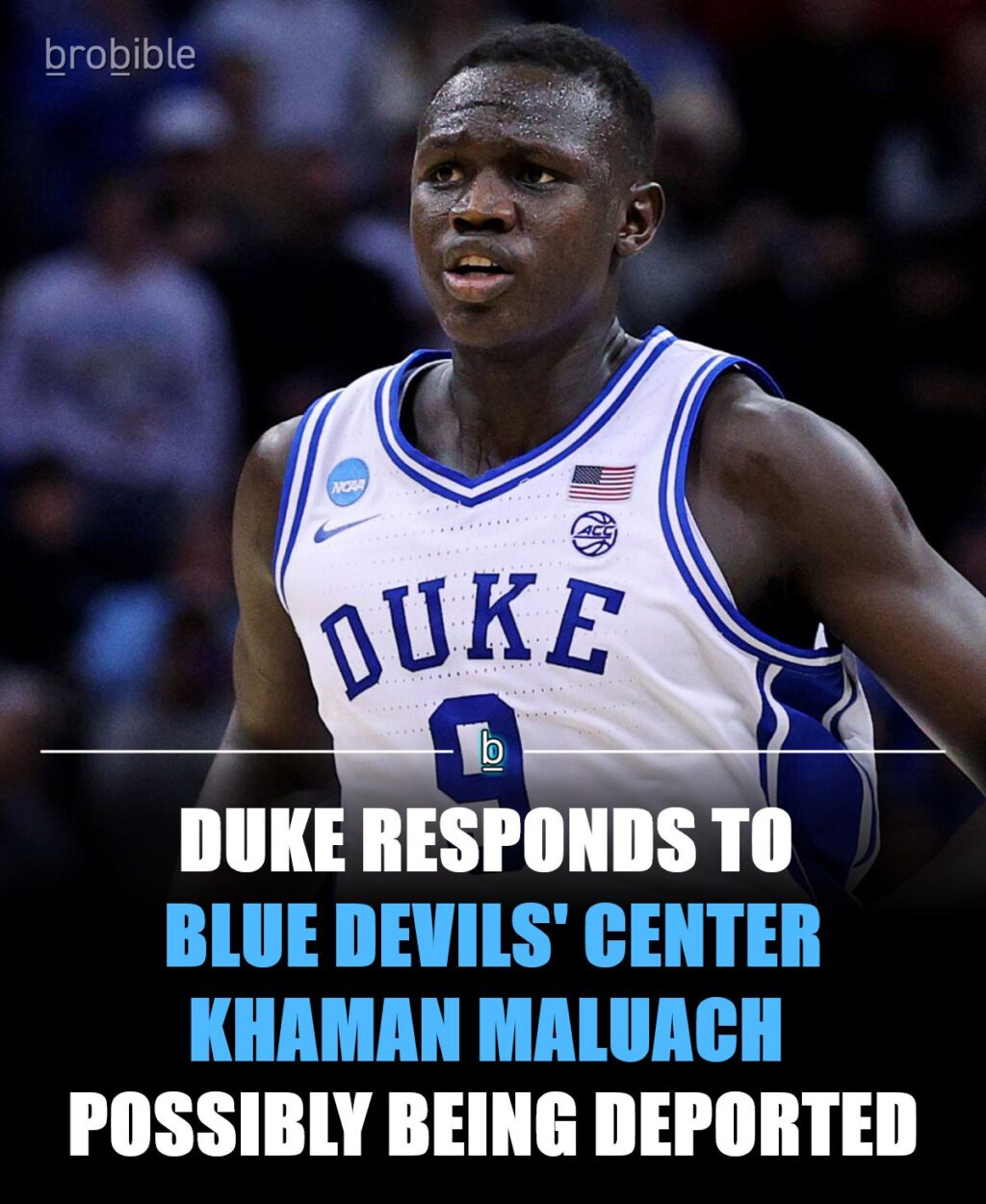
A new regulation may soon result in the deportation of 18-year-old Khaman Maluach, a South Sudanese freshman and a possible top-10 choice in the NBA Draft and star of the Duke Blue Devils. As things continue to unfold, his school has responded.
Khaman Maluach’s meteoric rise from a conflict-torn South Sudan to a potential top-10 pick in the 2025 NBA Draft has been nothing short of inspirational. Standing nearly 7-feet tall and possessing rare athletic gifts for his size, the Duke Blue Devils freshman has captured national attention — not just for his impact on the court, but now, unfortunately, for his precarious status off it.
A new federal regulation has placed Maluach, and others like him, in a deeply unsettling situation. Recent policy shifts aimed at nationals from South Sudan could soon result in his deportation, disrupting his basketball career and altering the course of his life. As news of this regulation continues to unfold, Duke University has officially responded, expressing concern and support for their star freshman.
The Regulation at the Heart of the Controversy
The new visa regulation, implemented under a directive from the U.S. Department of State, revokes current visas held by individuals from countries deemed “uncooperative” in accepting deported nationals. South Sudan — still grappling with post-civil war instability — has recently been added to that list.
Secretary of State Marco Rubio cited South Sudan’s failure to adequately repatriate its citizens as the primary reason for the measure. While the policy’s stated goal is to pressure foreign governments into compliance with U.S. deportation processes, the real-world effects on young people like Maluach are profound and immediate.
As a South Sudanese national on a student visa, Maluach now finds himself at risk of forced removal from the United States despite having no criminal record, full academic compliance, and a promising future that could soon include an NBA rookie contract.
Khaman Maluach’s backstory adds to the heartbreak of the situation. Born in South Sudan amidst violent conflict, Maluach grew up in refugee camps across East Africa. His size and athleticism caught the attention of the NBA Academy Africa, an elite training program designed to develop top prospects from across the continent.
From there, Maluach transitioned to Duke, where he immediately made his mark during his freshman season. Averaging 10.7 points, 8.1 rebounds, and 2.4 blocks per game, he quickly emerged as a critical piece of Duke’s Final Four run. His unique blend of shot-blocking, fluid mobility, and burgeoning perimeter skills have scouts projecting him as a lottery pick in the upcoming NBA Draft.
That dream now hangs in the balance.
Amid growing media attention, Duke University released a carefully worded statement supporting Maluach and other international students affected by the policy:
“Duke University is aware of the recently announced visa regulation changes affecting students from specific nations, including South Sudan. Our commitment is to stand by all of our students. We are actively engaging with legal experts, policymakers, and immigration officials to understand the full implications and advocate for the continued well-being and educational opportunities of those impacted. Khaman Maluach is a valued member of our community, and we are fully committed to supporting him during this uncertain time.”
Behind the scenes, sources inside Duke’s athletic department suggest that the school is already arranging legal counsel for Maluach and coordinating with NBA advisors. The university’s legal office is reportedly exploring every avenue — including humanitarian exceptions and temporary protected status (TPS) applications — to help him stay in the United States long enough to enter the NBA Draft and transition to professional status.
News of Maluach’s potential deportation has sparked widespread outrage and sympathy across the basketball community. NBA executives, agents, former players, and fans alike have voiced their support, calling the situation “a heartbreaking injustice” and “an unnecessary barrier” for a young man who has already overcome staggering odds.
Former Duke and NBA star Grant Hill, now a part-owner of the Atlanta Hawks, tweeted:
“Khaman Maluach represents everything great about perseverance and opportunity. Policies that harm students like him run counter to everything we should stand for. Hoping for a quick resolution.”
Likewise, NBA Commissioner Adam Silver addressed the situation during a media availability session:
“We are closely monitoring developments regarding Khaman Maluach and are hopeful that a solution will be found that allows him to pursue his dream without interruption.”
Several NBA teams reportedly interested in drafting Maluach are already working contingency plans, should his visa status complicate matters leading up to the draft. Some have suggested that if he were selected by a Canadian team like the Toronto Raptors, visa challenges could become even more complex.
In the short term, Maluach’s legal team will likely seek emergency relief to maintain his student visa or apply for humanitarian parole. Given his status as a student in good standing, advocates believe he has a strong case, although the timeline is perilously tight.
The NBA Draft Combine looms in May, and Maluach will need to be present and eligible to participate. Missing it could severely harm his draft stock, costing him millions of dollars in potential earnings.
Another concern is his ability to secure an appropriate work visa (likely a P-1 visa for professional athletes) once he enters the NBA. Normally, international players selected in the draft transition to such visas relatively smoothly, but the new regulations could complicate even that process.
If a quick resolution isn’t found, Maluach may be forced to leave the country, participate in the draft remotely, and navigate professional basketball from outside U.S. borders — a logistical nightmare for both him and potential NBA employers.
Maluach’s predicament has also reignited broader conversations about immigration policy, fairness, and the role of sports in providing life-changing opportunities. Many are using his story as a lens to highlight how sudden regulatory changes can uproot lives, often without considering the human cost.
“We talk so much about opportunity in this country,” said former NBA coach Stan Van Gundy. “Khaman is living proof that opportunity changes lives — and now we’re throwing that away over bureaucracy?”
Advocacy groups supporting refugee students have called for an immediate review of the regulation, especially regarding individuals already legally present and pursuing education or professional development.
In a powerful op-ed for The Atlantic, NBA Academy Africa director Roland Houston wrote:
“Khaman Maluach embodies the hopes of an entire generation of African youth. Deporting him would not only harm his future but send a chilling message to every young person who dreams of a better life through education and hard work.”
Despite the mounting uncertainty, those close to Maluach describe him as remaining remarkably composed.
“He’s just doing what he’s always done — putting his head down, working hard, and trusting that things will work out,” said Duke assistant coach Jai Lucas. “Khaman has overcome things that would break most people. This is another obstacle, but he believes in his dreams too much to give up now.”
Maluach himself has been measured in his public comments, releasing a brief statement via Duke Athletics:
“I am grateful for the opportunities I have received in the United States and at Duke. I hope to continue pursuing my education and basketball career here. I trust my coaches, my school, and my team to help guide me through this situation.”
He recently declared for the NBA Draft at the final possible deadline, signaling his intent to press forward with his dream, despite the turbulence swirling around him.
Maluach’s case may not be isolated for long. Experts warn that if these types of visa restrictions expand or intensify, international college athletes — who make up a growing and essential portion of NCAA rosters — could find themselves trapped in similarly precarious situations.
According to NCAA data, over 12% of Division I men’s basketball players are international students, with even higher percentages in sports like soccer and tennis. A crackdown on student visas could reshape recruiting strategies, scholarship offers, and even competition at the collegiate level.
“Programs may start to think twice about bringing in international athletes if there’s too much uncertainty attached,” said longtime college basketball analyst Jay Bilas. “It would be a huge loss — these athletes enrich college sports immensely.”
In the coming weeks, attention will turn to several critical junctures: Maluach’s application for temporary protected status or humanitarian parole, the NBA Draft Combine, and ultimately the NBA Draft itself in June.
Every decision between now and then will shape not only Maluach’s career but potentially set a precedent for how international student-athletes are treated under shifting immigration policies.
Meanwhile, the basketball world watches and waits — hoping that talent, hard work, and perseverance will prevail over red tape and politics.





